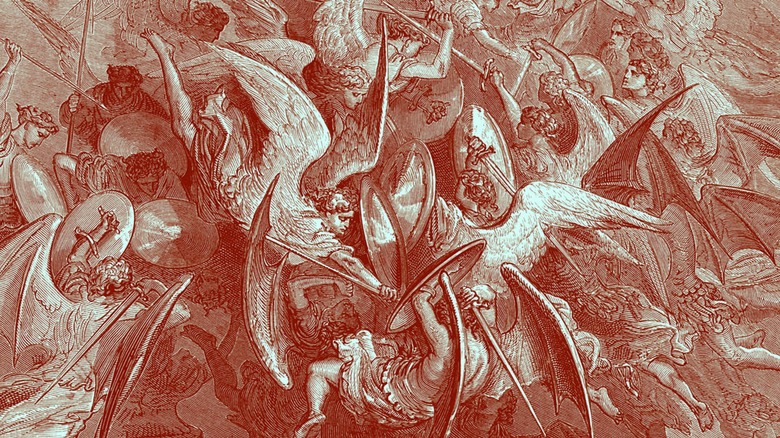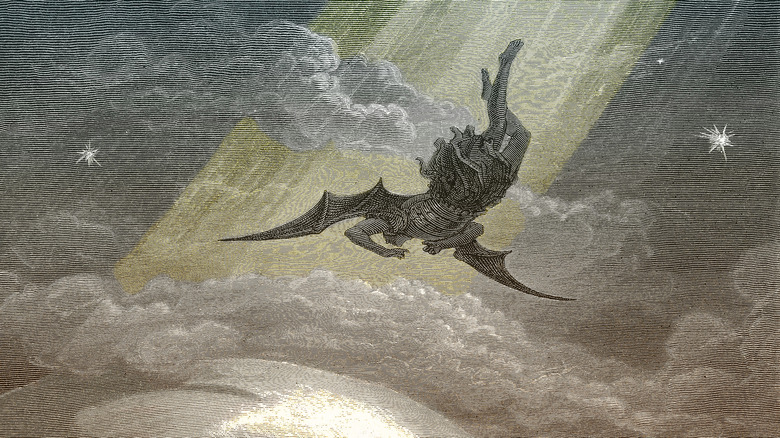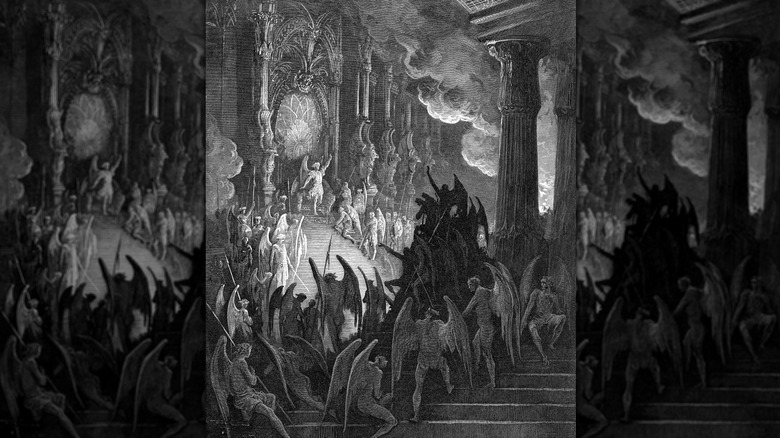What It Was Like When The Devil Rebelled Against Heaven, According To The Bible
If you ask a random person about the war in heaven, their mind may well jump to the story of Satan's fall. It's the story told in John Milton's "Paradise Lost," one of a disgraced angel who turned against God's plan and was cast out from heaven. But that tale never appears in the Bible as such. There are a handful of verses in the Old Testament that have been interpreted as telling the fall of Satan, which many Christians believe took place at the beginning of time. But modern scholarship tends to see them as speaking about enemy kings of Israel and Judea. They could always have a double meaning, but none of these verses are explicitly, undeniably about the devil and his war with God.
The one book of the Bible that does deal with a war in heaven isn't concerned with Satan's fall before the existence of the world. It's concerned with apocalyptic visions nestled within a work of literature about earthly affairs — the Book of Revelation. Specifically, Revelation 12:7 to 12:10 describes a battle between the archangel Michael and a great dragon, specifically called out as "that old serpent, called the Devil, and Satan, which deceiveth the whole world." The author writes that the devil and his followers were cast down into the earth, opening the way for salvation.
The war in Revelation is sometimes interpreted as a parallel to Satan's fall
The Book of Revelation, contrary to popular belief, is not a prophecy about the end of the world. It's a work of apocalyptic literature, a bleak and heavily symbolic genre within Judaism that took a grim view of earthly affairs while looking forward to God's ultimate deliverance. In that context, the war in heaven described by the author, John, isn't a literal vision of a war to come. It's a colorful and fantastical analogy for the struggles the early Christians faced living under the Roman empire.
It's also helped to inform the more well-known, non-biblical stories about Satan's initial fall from grace. John Milton's "Paradise Lost" certainly seemed to draw on Revelation when it cast Satan as a once proud and mighty archangel who couldn't abide God's command to follow Jesus. Therefore, "he resolved / With all his Legions to dislodge, and leave / Unworshipped, unobeyed the throne supreme."
But the battle of Revelation has also been interpreted as a parallel to Satan's fall. Jesus himself says in Luke 10 that he saw Satan's descent. And in the Mormon church, it's explicitly taught that Satan rebelled out of jealousy and was cast down along with all his followers.
Satan isn't barred from heaven in the Bible
Whether the war in heaven happened at the beginning of time, is destined to happen at the end, or exists only as an apocalyptic allegory, one might question how it could happen at all. Except in the former case, scenarios for a war in heaven would require that Satan be able to reach it. If he was cast out, how would that be possible?
But it's never explicitly said in the Bible that the devil was banished from heaven. In some translations, which name various figures in the Old Testament as Satan, he seems able to come and go anywhere he'd like and even goes on errands passed down by God himself. Within the New Testament, he has sufficient freedom of movement to tempt Jesus. And in some notions of Christian cosmology, there are actually three heavens, so Satan may well have been cast down from one while retaining access to the lower realms.
Of course, some of this theology supposes that those figures from the Old Testament really are the devil. "Satan," from the Hebrew "ha-satan," literally translates as "adversary." These characters may be better thought of as angels playing devil's advocate or acting as messengers.


